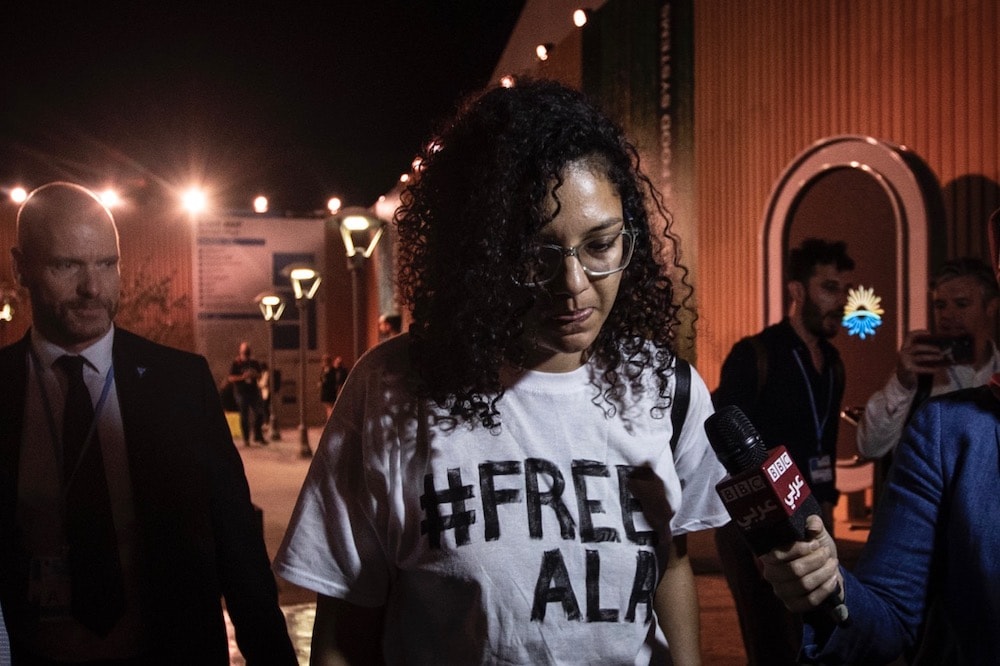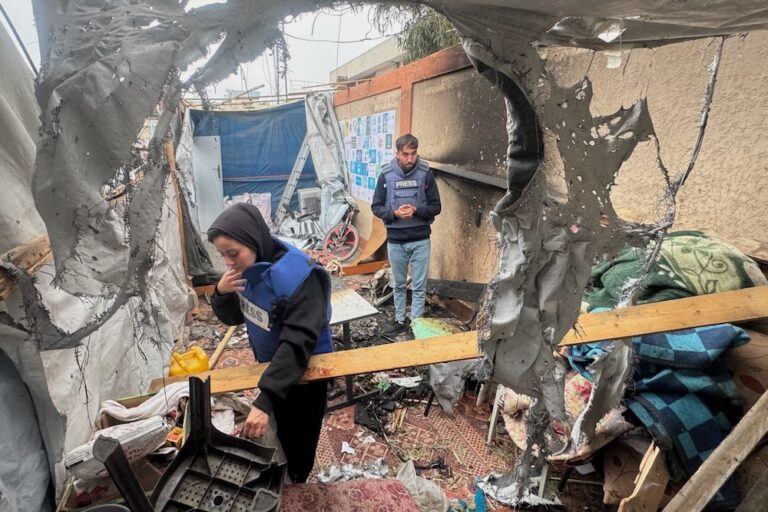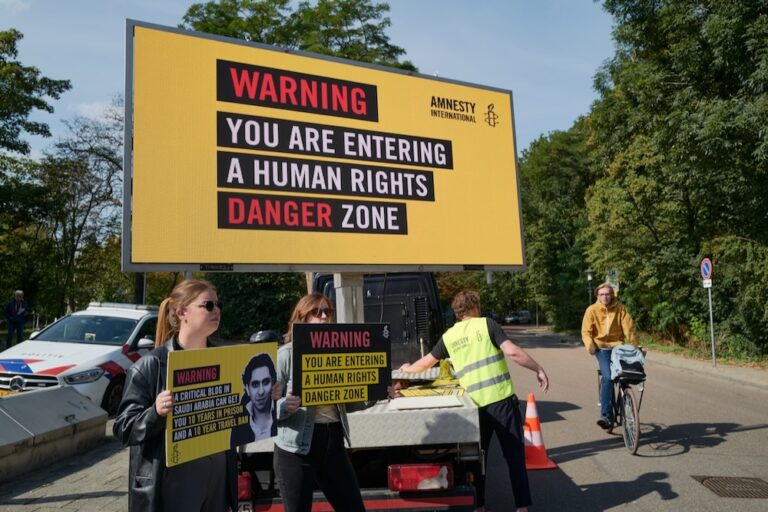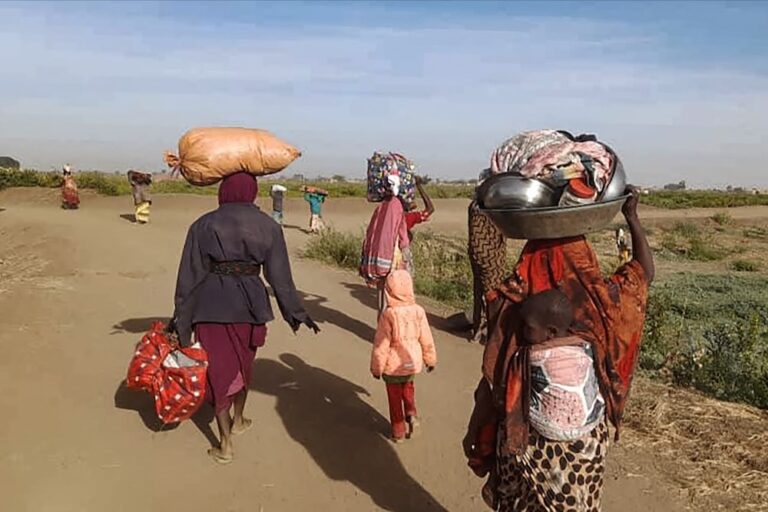October 2022 in Middle East and North Africa: A free expression roundup produced by IFEX's Regional Editor Naseem Tarawnah, based on IFEX member reports and news from the region.
Global climate summit hosted amidst an atmosphere of fear in Egypt’s restricted civic space. Qatar hinders reporting ahead of the 2022 World Cup. And systemic impunity fuels Iran’s brutal crackdown on protests.
Egypt’s restricted civic space: Alaa Abd El Fattah’s life at risk during COP27
As world leaders gather in Sharm El-Sheikh for the UN Climate Change Conference (COP27) this month, Egypt’s human rights record and restrictive civic space has come under the glaring spotlight of the world stage.
With tens of thousands of prisoners of conscience continuing to languish behind bars for exercising their right to free expression, the plight of imprisoned writer and activist Alaa Abd El Fattah has become emblematic of the country’s deepening human rights crisis. Having endured over 200 days of a partial hunger strike, Abd El Fattah announced his decision late last month to go on a full hunger strike during COP27, in a final bid for freedom.
In a letter to his family announcing the escalation of his hunger strike, Abd El Fattah wrote:
“If one wished for death then a hunger strike would not be a struggle. If one were only holding onto life out of instinct then what’s the point of a strike? If you’re postponing death only out of shame at your mother’s tears then you’re decreasing the chances of victory…. I’ve taken a decision to escalate at a time I see as fitting for my struggle for my freedom and the freedom of prisoners of a conflict they’ve no part in, or they’re trying to exit from; for the victims of a regime that’s unable to handle its crises except with oppression, unable to reproduce itself except through incarceration.”
Ahead of the climate summit, Abd El Fattah’s sisters Sanaa and Mona Seif began a sit-in outside the UK Foreign Office in London last month to demand Foreign Secretary James Cleverly take action to secure their brother’s release. Rights groups also voiced fears about the British-Egyptian activist’s life as a result of his full hunger strike, pressing world leaders at COP27 to intervene immediately, before the climate conference ends.
Environmental activists in the country have reported a sharp reduction in the space for independent environment and climate work since President Abdel Fattah al-Sisi came to power in 2014. From endless prosecutions, asset freezes, and travel bans against staff members, to harassment and intimidation tactics, including arrests – activists describe a general atmosphere of fear.
In the weeks leading up to the UN conference, authorities arrested dozens of Egyptians who were calling for protests during the climate summit.
Further underscoring Egypt’s restrictive civic space, groups and representatives of residents from the Sinai region, where the climate conference is being held, were excluded by authorities from participating in the event.
Since 2013, Egyptian authorities have displaced tens of thousands of North Sinai residents, razed agricultural land, and imposed restrictions on the movement of people and goods as a result of the military’s decade-long operations against the Islamic State branch in the peninsula. According to rights groups, thousands of residents in the region have been arrested, forcibly disappeared, tortured, and extra-judicially killed.
A petition calling on Egyptian authorities to open up civic space in the country ahead of the climate summit received support from hundreds of groups around the world, and was adopted as a resolution by the Forum on the Participation of NGOs in the Ordinary Sessions of the African Commission on Human and Peoples’ Rights.
“The main needed step to reach climate justice is to stop all repressive policies and respect human rights,” noted Mohamed Abdel Salam, executive director of IFEX member Association for Freedom of Thought and Expression (AFTE). “Egyptian citizens don’t have any chance to get knowledge regarding the effects of climate change and the Egyptian authorities don’t guarantee their fundamental rights to face these effects and raise their demands. That’s a result of many repressive policies, such as the security control of media outlets, restricting civil society activities, freezing the issuance of access to information law and declining independence of the judiciary.”
Restricted reporting in Qatar during World Cup
Qatar’s latest press accreditation for the 2022 FIFA World Cup imposed new restrictions on media and journalists reporting in the country. Ahead of the event, authorities published a list of conditions outlets must agree to upon applying for a filming permit; they include a ban on filming in government buildings, places of worship, universities, hospitals, as well as residential properties and private businesses.
The new restrictions relax earlier rules for obtaining a filming permit that required media outlets to ‘acknowledge and agree’ they will not produce reports that may be ‘inappropriate or offensive to the Qatari culture, Islamic principles’. However, limiting where the media can film restricts foreign journalists’ ability to investigate alleged abuses, including the exploitation of migrant workers, the treatment of the country’s LGBTQI+ community, and women’s rights.
“By requiring that the media, when they apply for accreditation, agree to abide by a number of conditions, some of which are vague, ambiguous, and open to arbitrary interpretation, Qatar is clearly seeking to discourage, if not prevent, the foreign media from talking about anything other than football,” RSF secretary-general Christophe Deloire said.
Qatar’s human rights record has increasingly come under scrutiny in the lead-up to the global football tournament. Rights groups have been pressing FIFA and the Qatari government to commit to remedying abuses against thousands of migrant workers, many of whom faced grave exploitation while constructing the country’s service infrastructure to host the global event.
According to Human Rights Watch (HRW), many migrant workers fell into ‘debt bondage’ after paying unaffordable illegal recruitment fees that often take months or years to pay off. In August, authorities arrested and deported around 60 migrant workers who participated in a demonstration in Doha after having gone months without receiving wages.
Meanwhile, LGBTQI+ people continue to face arbitrary arrests by Qatari security forces, and are subjected to ill-treatment while in detention. HRW documented several cases of people arrested in public places based solely on their gender expression, and subjected to unlawful phone searches, forced government conversion programs, and severe abuse while in detention. According to the rights group, Qatar’s repressive free speech climate, especially when it comes to LGBTQI+ rights, has made many with similar experiences of mistreatment afraid to speak out due to risk of retaliation.
HRW also called on authorities to repeal article 285 of the country’s Penal Code that criminalizes extramarital sex and same-sex relations, and introduce legislation protecting against gender discrimination, saying: “freedom of expression and nondiscrimination based on sexual orientation and gender identity should be guaranteed, permanently, for all residents of Qatar, not just spectators going to Qatar for the World Cup.”
Systemic impunity fuels Iran’s brutal crackdown
As anti-government protests continued to rage across Iran last month in the wake of Mahsa Amini’s death in custody, a ruthless crackdown by authorities has seen scores of demonstrators, activists, journalists and women rights defenders arrested, and at least 277 reportedly killed. Iranian police reportedly fired live rounds on thousands of people that had gathered in Amini’s home city of Saqqez to mark the 40th day of mourning.
The state’s violent suppression spurred calls for an urgent UN Human Right Council session to establish an independent, investigative, reporting and accountability mechanism, given the gravity of the human rights violations being committed under Iran’s prevailing systemic impunity. Rights groups pointed to a horrific pattern of Iranian security forces firing live ammunition and metal pellets, including birdshot, at protesters and bystanders, including children.
IFEX joined civil society organisations expressing solidarity with Iranian women and protesters, and reiterating calls for accountability for the killing of protesters.
Since the protests began, Iranian authorities have also detained an alarming number of tech engineers and network administrators who have been vocal on digital rights in the country, including prominent blogger and one of Iran’s leading technologists and digital rights defenders Amiremad (Jadi) Mirmirani. According to rights groups, targeted voices include those who have expressed opposition to the government’s draconian User Protection Bill.
Latest from Saudi Arabia
Heavy prison sentences were handed down last month to ten Egyptian Nubian citizens who have been detained since their arrest in July 2020 for organising a symposium at a Nubian association in Riyadh in 2019. Receiving jail sentences ranging between 10 and 18 years, the Nubians were accused of belonging to the Muslim Brotherhood after holding a cultural event to commemorate the contributions of Egyptian Nubians during the October 1973 war. According to rights groups, the citizens were forcibly disappeared, interrogated about their political views, and subjected to torture during their detention.
Civil society organisations continued to raise the case of imprisoned activist and University of Leeds student Salma al-Shehab, who was sentenced to 34 years in prison in August for her online posts. IFEX joined rights groups in a joint letter to the UK Foreign Secretary, urging British authorities to act for her immediate release, as well as the release of all others imprisoned in Saudi Arabia solely for exercising their right to free expression.
New & Noteworthy
A new online campaign aims to highlight the role that civil society has played in successfully advocating for rights and freedoms, as well as the importance of civil society as a platform to voice opinions and demands. Produced by the Gulf Centre for Human Rights (GCHR) and Innovation for Change MENA Hub, the WeActTogether campaign features stories from Morocco, Iraq, and Bahrain, and touches on a wide range of issues related to freedom of expression, and where civil society has responded to communities’ needs.
Lastly, Bread&Net, the annual “unconference” on digital rights in Arabic-speaking countries is taking place from 15-17 November. Hosted by Social Media Exchange (SMEX), this year will see hundreds of activists, researchers, journalists, and human rights defenders gather in Beirut – and online – to tackle critical issues, including online misinformation, surveillance, and digital authoritarianism, among others.



